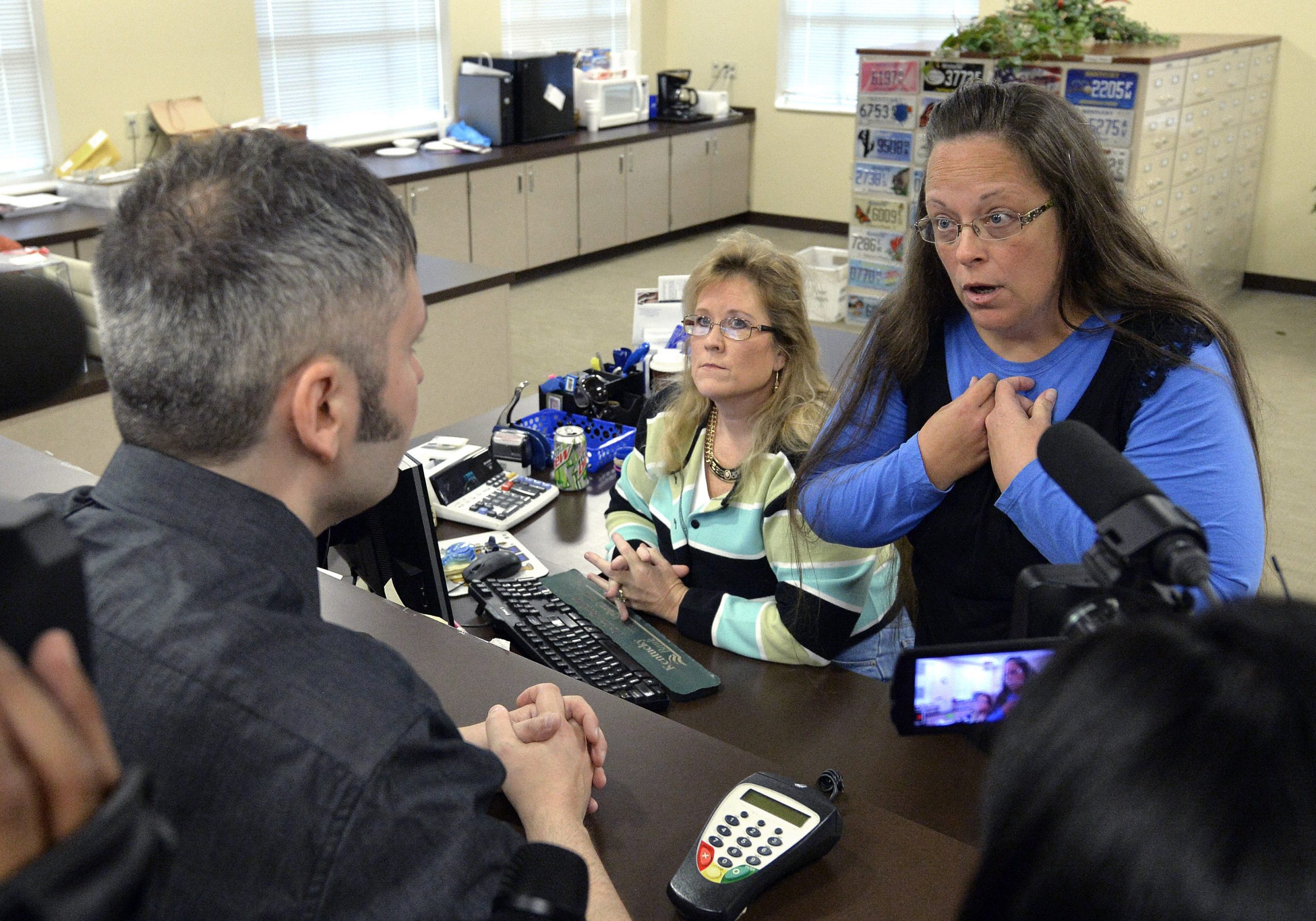Lawyers for Kim Davis, the former Kentucky county clerk who received international attention for denying same-sex couples marriage licenses, say the 6-3 Republican-appointed majority on the Supreme Court could absolve her of wrongdoing after a series of religious liberty decisions.
With representation from Christian nonprofit organization Liberty Counsel, her lawyers said in a July 15 filing that the high court has decided three cases that are “sharpening and amplifying the free exercise rights” at the core of Davis’s qualified immunity defense, which she argues are her sincerely held religious beliefs against same-sex marriage.
She’s been in legal battles since 2015, and now, her counsel cites the Supreme Court’s recent pro-religious liberty decisions siding with a Christian baker who refused to bake a cake for a same-sex wedding, a high school coach who prayed on the football field, and a ruling in favor of religious charity groups’ refusal to send foster children into same-sex couples’ homes.
Attorneys filed their latest arguments earlier this month with the 6th U.S. Circuit Court of Appeals in Cincinnati for Davis’s bid for a full-court review of her appeal. Additionally, the circuit court now leans more conservative following former President Donald Trump’s appointment of six judges to the federal bench.
THOMAS: SUPREME COURT SHOULD ‘CORRECT THE ERROR’ ON CONTRACEPTION AND SAME-SEX MARRIAGE

“Consideration by the full Court is therefore necessary to overcome the prior panel’s conflicts and restore fidelity to Supreme Court and Sixth Circuit precedents,” they wrote.
The court filings come as Davis and her attorneys have been fighting civil lawsuits from same-sex couples seeking damages for her defiance to grant marriage licenses for nearly seven years, despite the result in the landmark 2015 case Obergefell v. Hodges, which legalized same-sex marriage in the United States.
Davis’s most recent argument also asserts that she should have qualified for a religious exemption as a public official, claiming she shouldn’t have to distribute documents in violation of her religious beliefs, according to Mat Staver, chairman of Liberty Counsel, which is representing Davis.
“She should have qualified immunity from this lawsuit, where they’re seeking to have her personally responsible for damages, because she is protected by the First Amendment free exercise of religion,” Staver told the Washington Examiner.
Staver also suggested that if then-Gov. Steve Beshear (D-KY) “followed the law and granted Kim Davis a religious accommodation, there would be no case.”
The most recent filings by Davis’s legal team follow a ruling by a judge in March that she violated the constitutional rights of several plaintiffs when she refused to sign their marriage certificates, one of them being David Ermold.
“After S-E-V-E-N years, Judge Bunning finally ruled that Kim Davis intentionally violated our constitutional rights,” Ermold tweeted in March.
“Now, the question is will they hold her financially responsible for the insensitive and irrational legal mess that SHE created,” he said, adding that “it feels like seven years of legal purgatory.”
Davis was jailed for five days in 2015 for contempt when she failed to comply with a federal court order following the Supreme Court’s ruling in Obergefell. While away, her colleagues issued the licenses without her signature on the documents.
As a result of the high court’s Obergefell ruling, Davis wrestled with an ultimatum between her religious beliefs and her line of work. When she chose to follow her religious faith, she was sued almost immediately for violating the constitutional rights of same-sex couples.
Davis, a Republican who has been married four times, lost her 2018 bid for reelection as clerk in Rowan County against Democrat Elwood Caudill Jr. by around 700 votes.
When the Supreme Court overturned the national right to abortion last month, it was Justice Clarence Thomas who provoked fears from same-sex marriage advocates and Democrats due to his concurrence saying that the high court should be open to revisiting other cases that fall under previous due process precedents, “including Griswold, Lawrence, and Obergefell,” the justice wrote.
Justice Samuel Alito authored the opinion in favor of Mississippi’s ban on abortion after 15 weeks of gestation, though Alito did not suggest he was in favor of revisiting the due process precedents suggested by Thomas in his June 24 Dobbs v. Jackson Women’s Health Organization decision.
However, it was specifically in the October 2020 case of Davis v. Ermold that both Thomas and Alito suggested their view on the “problem” Obergefell created for religious liberty, despite both justices concurring in the denial of certiorari, which blocked the case from being heard by the nine justices.
In that case, Davis argued that she was immune from lawsuits filed by same-sex couples to whom she had denied marriage certificates under the doctrine of qualified immunity.
“By choosing to privilege a novel constitutional right over the religious liberty interests explicitly protected in the First Amendment, and by doing so undemocratically, the court has created a problem that only it can fix,” Thomas, joined by Alito, wrote. “Until then, Obergefell will continue to have ‘ruinous consequences for religious liberty.'”
Obergefell, which was based on the Constitution’s 14th Amendment’s due process clause, was a narrow 5-4 decision.
CLICK HERE TO READ MORE FROM THE WASHINGTON EXAMINER
The court has gained three conservative justices and a 6-3 conservative supermajority. Concerned with the court’s agenda, the House passed a bill that would codify same-sex marriage into federal law, which saw 47 Republicans join Democrats to vote 267-157 in favor of the measure. It now awaits Senate action.

